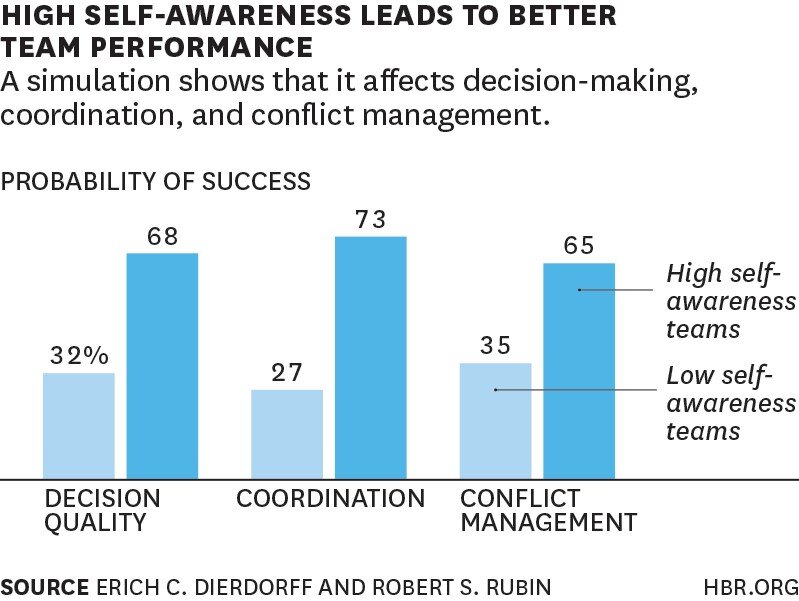The Paradox of Self-Awareness
Someone recently asked me, “How self-aware are you?” My initial response was that that I’m pretty self-aware, I’ve done lots of coaching, personal development and mindfulness and know myself reasonably well. On reflection I also observed that each time I become aware of something about myself it reminds me how of little I knew.
What is self-awareness?
Author of Emotional Intelligence, Daniel Goleman, proposed that self-awareness is “knowing one’s internal states, preference, resources, and intuitions.” It is also being aware of how consistent (or inconsistent) our self-view is compared to an external data i.e. how others view us or against certain measures.
Does self-awareness matter?
Erich C. Dierdorff and Robert S. Rubin collected data from an executive development program at a Fortune 10 company. They tested 58 teams with more than 300 leaders in a business simulation and examined the extent to which accurate self-awareness was related to team effectiveness.
When individuals were less self-aware (i.e. there was a large gap between the assessments of their own behavioural contributions and the assessments of their team members), the teams substantially suffered. In fact, teams with less self-aware individuals made worse decisions, engaged in less coordination, and showed less conflict management.
The most damaging situation occurred when teams were comprised of significant over-raters (i.e., individuals who thought they were contributing more than their team members thought they were). Just being surrounded by teammates of low self-awareness (or a bunch of over-raters) cut the chances of team success in half.
The Dunning-Kruger effect
Over-rating one’s own abilities is something Justin Kruger and David Dunning studied in a variety of social and intellectual areas. The authors found that participants scoring in the bottom quartile on tests of humour, grammar, and logic grossly overestimated their test performance and ability. Although their test scores put them in the 12th percentile, they estimated themselves to be in the 62nd. This is illustrated by the fact that 90% of people think they have an above average sense of humour and 95% of people think that are above average drivers. As Charles Darwin said, “Ignorance more frequently begets confidence than does knowledge.”
The Paradox of Self-Awareness
To me there is a certain paradox with self-awareness because if someone has very little they will, by definition, not be aware of this. Similarly, the more someone is self-aware, the more they realise how much there is to discover.
Developing Self-awareness
Mark Manson (NY Times bestselling author of The Subtle Art of Not Giving a F*ck) writes that there are 3 levels of self-awareness. I'll summarise here but I highly recommend the article if you're interested.
Level 1 is about our automatic patterns of avoidance through distraction. Most of the time we avoid pain or difficulty by distracting ourselves with something, anything… our phones, food, TV, exercise, talking to others…. Some of this might, of course, be very helpful but when we aren’t aware of it, when we distract ourselves on autopilot then our distractions are choosing us instead of us choosing them.
Level 2 is about being aware of what we’re actually feeling and why. This can be hard. It’s often much easier to project our anger onto that guy who cut us up on the road or take it out on a partner. Removing distractions allows us to have more space to feel things and pursue a line of self-enquiry to discover more about them. Coaching, therapy, meditation and journaling can all provide a similar space where we can explore this more fully.
Level 3 is about becoming aware of our blind spots. We like to think of ourselves as rational beings but the reality is far from this. Our memories are not as accurate as we think (ask the police who will get two conflicting eye-witness reports about something), we are constantly subject to confirmation bias where we unconsciously prefer to confirm ideas we already have rather than question them, and we have a negativity bias in our decision making (we would typically feel worse about losing £1000 than we would feel good about gaining £1000). There are many many examples that merit an article in themselves.
So what?
Research tells us that developing self-awareness makes us more productive in teams, better leaders and better partners and friends. The good news is that you can start right now. You might like to notice your responses to this article and reflect inwardly on them without judgement. For myself, as I write this, I notice some pride and anxiety. I’m pleased with what I’ve written but also anxious that when I press the ‘publish’ button I will open myself to criticism for it. Developing self-awareness isn’t always easy but I think it’s always worthwhile.
IReferences
1. Emotional Intelligence: Why It Can Matter More Than IQ by Daniel Goleman.
2. https://hbr.org/2015/03/research-were-not-very-self-aware-especially-at-work
3. Unskilled and unaware of it: how difficulties in recognizing one's own incompetence lead to inflated self-assessments. Kruger J, Dunning D. Journal of Personality and Social Psychology. 1999
4. Mark Manson – The Three Levels of Self-awareness https://markmanson.net/self-awareness


